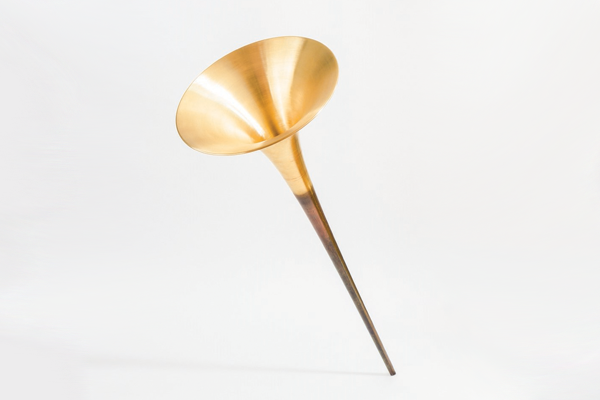
A new exhibition at London’s Design Museum, curated by Barber Osgerby, offers an insight into the production of everyday objects.
Above: French horn in the making
Story continues below advertisement
Production is a vital aspect of design, yet the manufacture of everyday objects is most often shrouded in mystery. From corks and pencils to cricket bats and glass marbles, we recognise the objects but not the process of their creation. This is the premise upon which In the Making, a new exhibition at London’s Design Museum, curated by designers Edward Barber and Jay Osgerby, is based.
“We have always been fascinated by the making process and it is an integral part of our work,” they say. “We have curated this exhibition to provide a platform to capture and reveal a moment in the manufacturing process, unveiling everyday objects in their unfinished state.”
Swarovski glass optic lens in the making
Story continues below advertisement
The result is an exhibition in two parts: the first is a collection of 25 everyday objects showcased in a suspended state of production, and the second is a visual depiction of the raw material and the finished object, accompanied by videos of the manufacturing process.
“[The objects] start to tell you things about their future,” says Barber. “They have the visual potential to be something we all know.” Surprisingly, many of the half-finished objects are more beautiful than their finished counterparts, offering viewers a glimpse of familiarity through the raw materials.
Story continues below advertisement
Derwent pencils 9-ply bock in the making
As is to be expected, the exhibition showcases several examples of Barber Osgerby’s own work. The duo’s renowned ‘Tipton’ chair for Vitra – shown just a few minutes into the injection moulding process (90% of the total production) – is described by Barber as “a rather ugly thing”. This might be true, but it gives an insight into the process of injection moulding that we rarely get the chance to observe.
There is also the flat aluminium outer skin of Barber Osgerby’s London 2012 Olympic Torch (stopped at 10% of the production process). The construction, says Barber, is similar to that used to produce an aluminium drink can – fitting, as this is next in the line of half-finished objects. “What’s interesting is that in the current state it’s paper like and very fragile, the minute the top is put on it becomes a very strong container,” says Osgerby of the Coca Cola can.
Some of the most interesting pieces in the exhibition, are the simplest of objects: a glass marble being formed, dumbbell blanks, die-cut from a sheet of felt and destined to become tennis balls, a silver fork blank, or a brass casting blank of Hansgrohe Axor taps.
“The thing that fascinated us about the taps was that Hansgrohe produce them in pairs because that’s the most efficient way,” says Osgerby. “Also to see that there is probably more material here that is wasted (and then recycled) than is used for the tap itself.”
C0ca-Cola aluminium can in the making
Barber points out that it’s the same process used to create bronze sculptures, raising intriguing questions about what status these suspended objects hold – are they sculptural artworks, or simply “a step toward brushing your teeth in the morning”.
Seen in this way, it is easy to see the similarities between normally disparate objects, their method of production becoming a common thread despite differences in material or form. A surprising number of objects, from tennis balls and football boots to the Olympic torch, for example, begin their life as ambiguous and surprisingly graphic flat forms.
In the Making is on at London’s Design Museum until 4 May 2014.
designmuseum.org/exhibitions/2014/in-the-making
Mandi Keighran is Editor-at-Large for Indesign, based in London.